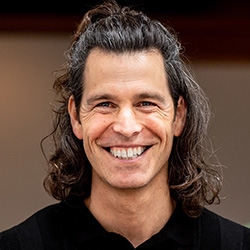

Search Results: body
-
Observation is the awareness of our sensory perceptions and thoughts, separate from evaluations and judgments. Feeling involves bodily sensations and emotions, distinct from "faux feelings" that mix thought and emotion. Needs encompass universal human requirements for survival and wellness, while thoughts and evaluations express needs. Requests are rooted in connection and invite true willingness, rather than demanding compliance.
-
- 3 full-length courses to deepen your empathy practice
- Learn your body’s “language” and how to listen deeply to it
- Quickly reconnect and return to empathic presence when you are triggered
- Enhance your listening skills and experience greater ease and joy in all your interactions
-
Learn to teach from intention, rooted in NVC principles and your audience’s real-world needs.
-
When we're faced with certain situations we tend to go into a fight, flight or freeze mode. While these can sometimes be helpful and even lifesaving, they can also be crippling when the situation may not be life-threatening. In this episode, we give you some tips on how to shift into a more intentional way of handling difficult situations.
-
In our fast-paced, busy lives it is tempting to practice NVC mostly with the left hemisphere of the brain, thinking through the steps quickly without slowing down to connect more deeply with feelings and needs. Don't miss an opportunity to integrate the hemispheres of the brain and the valuable information from the neural networks in the heart and gut.
-
Trainer tip: Do you get into “right fights”? You know you’re in one when you’re arguing with somebody in order to be right or because you want to win. What needs do I hope to meet from winning or being right? Notice if you enter into a right fight today and shift your focus to your needs and connecting with the other person's needs.
-
Welcome to the final video in our 3 part Embodied NVC Life Hack series. So far we've learnt about rewiring our brain from a flight, fright or freeze reaction to the choice of self-empathy, allowing us to centre and check-in with ourselves. In part two, Empathy Skills, we went beyond self-empathy to look at ways we can empathise with the other person. In this final instalment, we create a bridge from empathising to expressing.
-
Ask the Trainer: "In trainings I say our jackals are thoughts and now I've come to wonder if all thoughts are jackals...?"
-
The highest leverage point for effective meetings is preparing with self inquiry. Before saying something, we can ask ourselves about who this is serving, what needs it serves to say it, if there is a request we want to make, how to make the request actionable, and more. If more people at meetings do this, it can reduce the overall number of tangents we experience at meetings.
-
This anecdote illustrates how a young man had the social awareness to consider how male conditioning may bring up competitiveness in his interactions with another man. The young man offered transparency and checked for consent in a way that shows an embodiment of power-with, togetherness, consideration, care, collaboration... and all without displaying any formal NVC training, and without looking to impress.
-
Trainer Tip: People tend to look, act, and sound softer when they have been more fully heard. If you're unsure whether someone has been heard and you want to be cautious, you may ask them, “Is there anything else you’d like me to hear?”. If you try to reason with or educate them before they're heard, they'll likely respond negatively. After they're heard, you may notice a willingness on their part to listen and proceed.
-
We can get stuck in our heads. All kinds of thoughts float into our minds. We then get thoughts about those thoughts, they might even make you feel a certain way or change a behaviour. But what happens when we connect our feelings with the physical sensations in our bodies? As part of our teaching at NVC we have incorporated movement work to help us connect with where we hold emotions and how we can process them effectively.
-
- Welcome unpleasant feelings and meet their flow in and around the body
- Discover how you can enjoy Anger as a beautiful life force
- Realize insecurity and depression as a door to the core of your humanity
- Know how to use fear to firmly connect to your life and strength
-
- Find intuitive guidance for bridging divides
- Connect to deep needs that have been habitually ignored
- Discharge the anxiety held in old, embodied reactions
- Make decisions and take actions that align with your values
- Cultivate resources for more enjoyably and more capably building relationships
-
Trainer Tip: When we withhold our truth or lie, we can create emotional and physical distance in our relationships. By being honest, we can strengthen relationships. And when someone doesn’t appreciate your honesty, try empathizing with them. It can help to notice how your actions stimulate feelings in other people -- even as they are not the cause of their feelings.
-
Heal, reconnect and cultivate presence through self compassion as you restore wholeness.
-
A structured and clear contemplative practice can start with calming the body, heart, and mind for 20 minutes. Next, it contains at least three key elements: body awareness, clarifying what you already know, and consistent sustained attention. Celebrate and note insights, or any expanded perspective that pops into your awareness. Set an intention to notice these things in daily life and to practice further.
-
I greatly enjoyed my New Year’s Peace Meditation yesterday as it brings together NVC enthusiasts from across the world. It is one of my favorite traditions for welcoming the New Year!
-
Learn how your inner relationship forms the basis for Focusing and NVC.
-
What are the most powerful things I can do to build an inspired relationship? I answered the question with romantic relationships in mind; however, I believe the answer below applies to all important relationships.

Quick Links
Subscription Preferences
Stay In Touch!
Looking for ways to keep up with NVC Academy news, get special offers, free resources, or words of inspiration? Here are five ways to stay engaged:




















